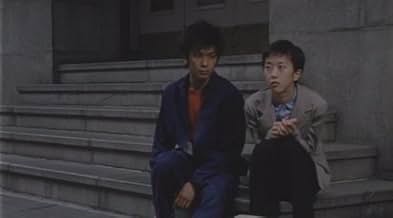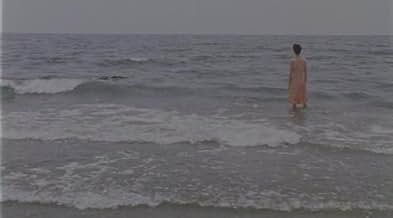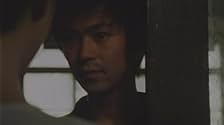VALUTAZIONE IMDb
6,4/10
476
LA TUA VALUTAZIONE
Aggiungi una trama nella tua linguaIn future Japan, a dangerous pollen falls upon Tokyo, endangering its populace. Two people volunteer to become tests subject for a drug that could possibly provide a cure.In future Japan, a dangerous pollen falls upon Tokyo, endangering its populace. Two people volunteer to become tests subject for a drug that could possibly provide a cure.In future Japan, a dangerous pollen falls upon Tokyo, endangering its populace. Two people volunteer to become tests subject for a drug that could possibly provide a cure.
- Premi
- 1 candidatura in totale
Recensioni in evidenza
The first film I saw which was directed by Kiyoshi Kurosawa was 'The Cure'. I thought it was one of the best Japanese films I had seen, and I eagerly looked forward to seeing more of his work. I have now watched another eight of his films and even though I didn't really expect to find another 'Cure', I have to say that I have been disappointed with each one of them. Now that I have seen 'Barren Illusion' I know that I am not going to take the trouble to view any more. For me, this film is the worst of them all and appears to be nothing more than a collection of out-takes from a couple of films which have been stitched together, given a title and released on an unsuspecting public. There is nothing of interest here, let alone anything to get excited about.
Kiyoshi Kurosawa's 1999 masterpiece, Barren Illusion, is a razor-sharp dissection of contemporary Japanese culture which depicts its subject as being so devoid of its own identity that it's almost completely co-opted by mundane Western artifacts. In scene after scene--sometimes subtly, sometimes not so subtly--Kurosawa shows objects with obvious English language markers as critical components of required activity in day-to-day lives. And an all-Japanese music group intermittently shows up pounding on an assortment of Brazilian drums to emphatically demonstrate their (read, the culture's) need to immerse themselves in something completely different from what they are.
To emphasize this more dramatically, Kurosawa has the male lead, a sometime musician, occasionally fade in and out of his surroundings, as though a being who senses intelligently and who, at the same time, is an integral component of his culture, could not (or, perhaps, should not) exist if the culture itself has so little identity. In Woody Allen's Deconstructing Harry a character becomes blurred on screen, but that was a psychological observation linked to the individual's personality. Kurosawa's disappearing act is quite different, much more emphatically connecting the individual to his culture.
There is no real plot in the film, but the intelligence Kurosawa brings to bear is so powerful, a plot is not necessary--nor would it work. He frequently has his characters repeat the same banal action in the same scene (stamping postal documents, kicking a balloon around), indicating much more than a lack of imagination. It is, Kurosawa says, the sterility of a culture that engenders repetitive, non-thinking (i.e., sterile) behavior.
The female lead, a postal worker, is shown involved in activities (in two different scenes) which surely would result in her death--jumping off a building and being severely beaten by a gang of thugs. Yet in each case, she's shown in the immediately following scene alive and whole. How can one die when one does not really live?
This is a brilliant work, very highly recommended. It's a shame that none of Kurosawa's work is available in the U.S. on DVD or video. Rumor has it that Cure, another superb film, will be available in Summer 2002 domestically on DVD.
To emphasize this more dramatically, Kurosawa has the male lead, a sometime musician, occasionally fade in and out of his surroundings, as though a being who senses intelligently and who, at the same time, is an integral component of his culture, could not (or, perhaps, should not) exist if the culture itself has so little identity. In Woody Allen's Deconstructing Harry a character becomes blurred on screen, but that was a psychological observation linked to the individual's personality. Kurosawa's disappearing act is quite different, much more emphatically connecting the individual to his culture.
There is no real plot in the film, but the intelligence Kurosawa brings to bear is so powerful, a plot is not necessary--nor would it work. He frequently has his characters repeat the same banal action in the same scene (stamping postal documents, kicking a balloon around), indicating much more than a lack of imagination. It is, Kurosawa says, the sterility of a culture that engenders repetitive, non-thinking (i.e., sterile) behavior.
The female lead, a postal worker, is shown involved in activities (in two different scenes) which surely would result in her death--jumping off a building and being severely beaten by a gang of thugs. Yet in each case, she's shown in the immediately following scene alive and whole. How can one die when one does not really live?
This is a brilliant work, very highly recommended. It's a shame that none of Kurosawa's work is available in the U.S. on DVD or video. Rumor has it that Cure, another superb film, will be available in Summer 2002 domestically on DVD.
It seems that Kurosawa used some sort of the "stamps" during the shot period and totally forgot what he wanted to tell us (OK, OK, not to "us" - just to me). For a contrast you may see another Japanese title - "Enter the void", which itself is a one big "stamp" but is a masterpiece in, at least, its visual part. Because IMDb requires 10+ lines of review, I will add them in a quick way:
Music 3/10, despite the hero is a "music producer". Actors acting 7/10 - especially the heroine. An Idea behind the scenes - non trivial, hard to formulate. Realisation - oops, 3/10. Total 4/10. And the last line: of course, you should see it by yourself to have your own opinion and not to read such a stupid "reviews" like this one.
Music 3/10, despite the hero is a "music producer". Actors acting 7/10 - especially the heroine. An Idea behind the scenes - non trivial, hard to formulate. Realisation - oops, 3/10. Total 4/10. And the last line: of course, you should see it by yourself to have your own opinion and not to read such a stupid "reviews" like this one.
The filmmaker asks if it's unavoidable for young people who are in love to become a couple, to live together and eventually become a family. Oinaru Genei is made of little pieces from the lives of the two main characters, a young man who's a music producer and a girl who works at a postal office. It seems they don't want to move on in their relationship, don't want to grow up.
Director Kiyoshi Kurosawa explores the human condition in the post millennium. With the aid of his students from the film school of Tokyo, he creates an experimental and unusual love story.
Director Kiyoshi Kurosawa explores the human condition in the post millennium. With the aid of his students from the film school of Tokyo, he creates an experimental and unusual love story.
Of those few films I've seen to date from Kiyoshi Kurosawa I've enjoyed or loved most, though by no means are all equal. Here, I simply don't know what he was doing. By the time one-third of the runtime has elapsed no sign of discrete plot has manifested; what we have had is a collection of scenes that are random and detached, with connective threads so intangible and speculative that the stereotypical fringe conspiracy theorist, with his string and corkboard, is about as reasonable in his ramblings as what any average viewer may suppose. Dialogue is sparse, and irrelevant to any sense of "storytelling," by which I mean some acts of violence, some moments of people apparently behaving abnormally, and some moments of people engaging with electronic technology of one type or another. I'm reminded of 2001's 'Pulse,' which was big on atmosphere and incredibly vague with its ideas; the difference is that 'Barren illusions' has no atmosphere, and is, astoundingly, even more vague with its ideas. I've read the one-line synopsis. To sit and watch, connections between that outside context and the scenes playing out seem tenuous at best; with or without that outside context, I'm at best unsure if each scene in turn is enough to meaningfully begin to form a notion of what this movie might be about.
I guess it's well made, such as it is, but I can't bring myself to care about acting or craftsmanship when the theoretical substance is so hopelessly indefinite, nebulous, hazy, and downright indiscernible and flummoxing. What was Kurosawa intending with 'Barren illusions?' What should I be taking away from it? I genuinely don't know. I read what others have written about the picture and I wonder if they watched the same thing that I did. I came here expecting plot, or at least meaning, and what I got was purely amorphous and indescribable. I know enough to recognize that the filmmaker operates on a level of esoteric intellectualism and artistry that's purposefully shrouded in mystery, closely-held secrets, and lofty symbolism, but there's a difference between swimming in a lake and diving in headfirst then refusing to come up for air. I'm simply at a loss. I guess I'm glad for those who check out this picture and find it to be a satisfying, worthwhile experience, but I've a hard time believing anyone could appreciate it without being on the same exact, precise wavelength as Kurosawa - and to that point, I don't know who I would or could ever recommend this to, because I don't know anyone who I'd anticipate to feel any differently than I do. Check it out if you want, but don't say you haven't been forewarned, and I wish you the best of luck.
I guess it's well made, such as it is, but I can't bring myself to care about acting or craftsmanship when the theoretical substance is so hopelessly indefinite, nebulous, hazy, and downright indiscernible and flummoxing. What was Kurosawa intending with 'Barren illusions?' What should I be taking away from it? I genuinely don't know. I read what others have written about the picture and I wonder if they watched the same thing that I did. I came here expecting plot, or at least meaning, and what I got was purely amorphous and indescribable. I know enough to recognize that the filmmaker operates on a level of esoteric intellectualism and artistry that's purposefully shrouded in mystery, closely-held secrets, and lofty symbolism, but there's a difference between swimming in a lake and diving in headfirst then refusing to come up for air. I'm simply at a loss. I guess I'm glad for those who check out this picture and find it to be a satisfying, worthwhile experience, but I've a hard time believing anyone could appreciate it without being on the same exact, precise wavelength as Kurosawa - and to that point, I don't know who I would or could ever recommend this to, because I don't know anyone who I'd anticipate to feel any differently than I do. Check it out if you want, but don't say you haven't been forewarned, and I wish you the best of luck.
Lo sapevi?
- ConnessioniFeatured in Demonlover (2002)
I più visti
Accedi per valutare e creare un elenco di titoli salvati per ottenere consigli personalizzati
Dettagli
- Tempo di esecuzione
- 1h 35min(95 min)
- Colore
Contribuisci a questa pagina
Suggerisci una modifica o aggiungi i contenuti mancanti






